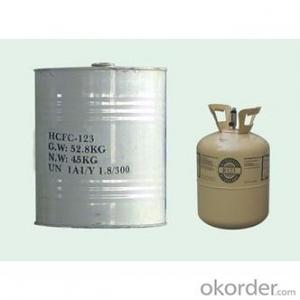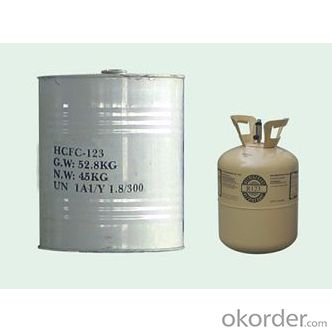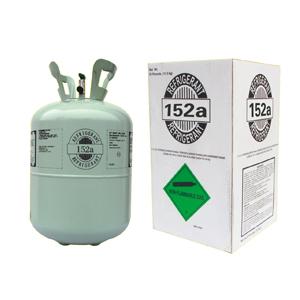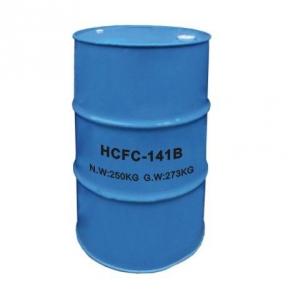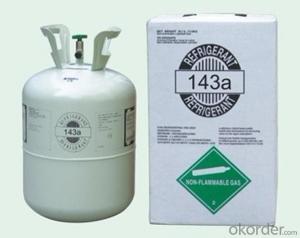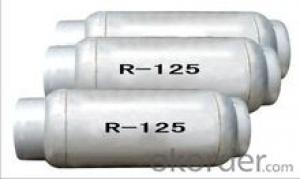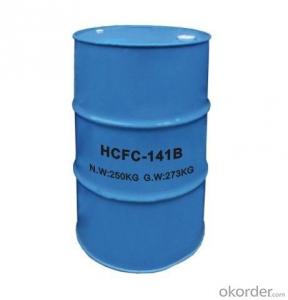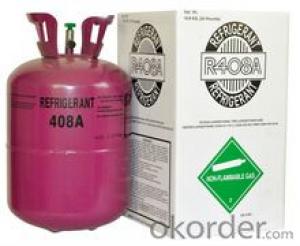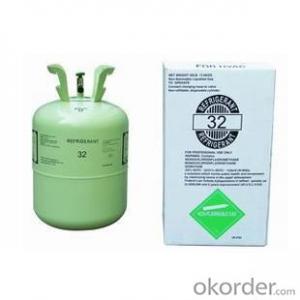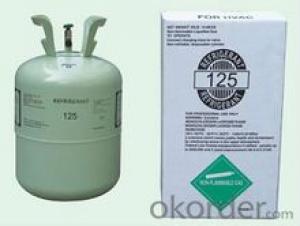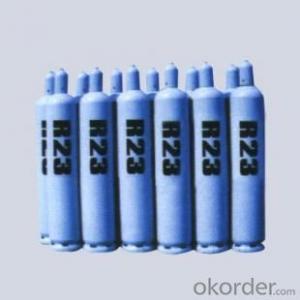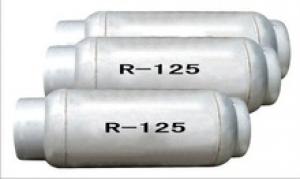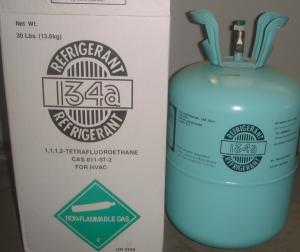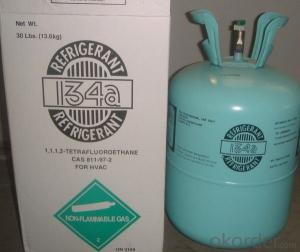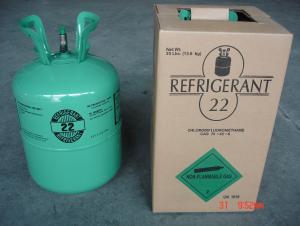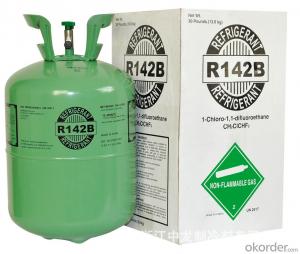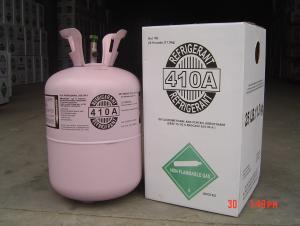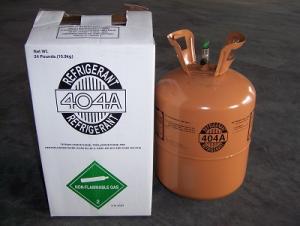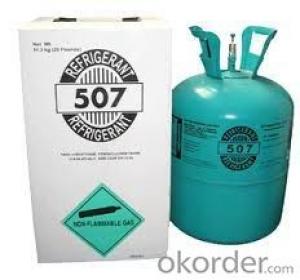Refrigerant R123 Gas
- Loading Port:
- Shanghai
- Payment Terms:
- TT OR LC
- Min Order Qty:
- -
- Supply Capability:
- 10000MT m.t./month
OKorder Service Pledge
OKorder Financial Service
You Might Also Like
Specifications
1-OEM is accepted
2-Reasonable and competitive price
3-Delivery time :15 days
4-Good sevice after sale
Replaced R11 in low pressure centrifugal chillers. Retrofitting existing R-11 chillers to R-123 may require replacement seals, gaskets and other system components to obtain the correct operating conditions and prevent leakage.
R123 mainly uses in large, low-pressure centrifugal chillers. And replaces R11 and R113 to use as cleaning agent, foamier and refrigerant, can.
Property of chloride
Formula: CHCI2CF3
Molecular weight: 152.98
B.P.,°C: 27.6
Critical temperature, °C: 183.67
Critical pressure, MPa: 3.673
Critical density, g/cm3: 0.549
Liquid density, g/cm3 @ 25°C: 1.46
Specific heat of liquid,25°C,KJ/Kg·°C: 0.985
ODP (CFC-11=1.0) 0.020
GWP (CO2=1.0) 77
Quality standard
Appearance: Colorless, no turbid
Odor: Odorless
Purity≥%: 99.8
Water ≤%: 0.002
Acidity ≤%: 0.0001
Residue on evaporation ≤%: 0.01
- Q: What is the difference between an aromatic compound and a hydrocarbon derivative?
- The aromatic compound is a benzene ring containing compound, which may be a hydrocarbon or a hydrocarbon derivative. Hydrocarbons are hydrocarbon-containing compounds, and hydrocarbons containing hydrocarbons other than hydrocarbons are derivatives of hydrocarbons. The two concepts have crossed.
- Q: What is the hydrocarbon thing
- Hydrocarbons can be divided into: open chain hydrocarbons (carbon atoms in hydrocarbon molecules in open chain) - saturated hydrocarbons - alkanes - unsaturated hydrocarbons - olefins and polyolefins (carbon - carbon double bonds, unstable) - alkynes and (Cyclopentane) - cycloalkene - cycloalkyne aromatic hydrocarbon - monocyclic aromatic hydrocarbon (benzene and its homologues) - fused ring aromatic hydrocarbons (Polycyclic aromatic hydrocarbons and their homologues) - polycyclic aromatic hydrocarbons (naphthalene, anthracene and other condensed ring aromatic hydrocarbons and their homologues) all hydrocarbons are hydrophobic, that all the hydrocarbons are not soluble in water and coal The main ingredients are hydrocarbons
- Q: What is the relationship between hydrocarbon and hydrocarbon derivatives?
- The hydrocarbon is the parent of the organic compound, and the other various organic compounds can be regarded as derivatives of one or more hydrogen atoms in the hydrocarbon molecule being replaced by atoms or radicals of other elements.
- Q: Are all carbon compounds all organic?
- Not organic matter that is organic compounds. Carbon compounds (carbon monoxide, carbon dioxide, carbonates, metal carbides and other rare carbon compounds excluded) or hydrocarbons and their derivatives in general. Organic matter is the material basis for life.
- Q: Hydrocarbons and hydrocarbon derivatives are not all non-electrolytes
- Hydrocarbons are, derivatives are not necessarily, such as organic acids (formic acid, acetic acid, etc.)
- Q: What is the difference between organic matter and inorganic matter?
- Inorganic matter is an inorganic compound. Generally refers to the elements other than carbon elements, such as water, salt, sulfuric acid, lime and so on. However, some simple carbon compounds such as carbon monoxide, carbon dioxide, carbonates, carbonates and carbides, because of their composition and properties and inorganic similar, so also as an inorganic to study. The vast majority of inorganic matter can be classified as oxides, acids, alkalis and salts.
- Q: Does Organic Chemistry Study the Performance of Hydrocarbons and Their Derivatives?
- Also study the structure and transformation
- Q: How to do it? Solve Inorganic Chemistry
- Inorganic chemistry is one of the earliest disciplines in the development of chemical science. It undertakes a major task of studying the composition, structure, properties and reactions of all elements and elements (except hydrocarbons and derivatives). The current development of inorganic chemistry has two distinct trends, that is, in the breadth of the broadening and depth of the advance. It is the three pillars of modern civilization
- Q: What is the most primitive person on earth?
- The process of organic life is roughly divided into three steps: first the original earth simple inorganic compounds to form the original organic matter (hydrocarbons and its simplest derivatives), the second is based on the first step, gradually developed into a complex Organic compounds (sugars, nucleotides, amino acids) and their polymer polysaccharides, nucleic acids and proteins, as well as other organic substances, and the third is that with the evolution of natural conditions on Earth, the above substances are complex interactions, resulting in a metabolic Characteristics, can grow, reproduce, inheritance, variation of the original organic organisms.
- Q: Are hydrocarbons all organic?
- A series of compounds with similar structures and different molecular composition of one or several "CH2" radicals are called the same series, and each member in the same series is called homologous, and the chemical properties of homologues are similar due to their similar structure. Their physical properties, often with the increase in molecular weight and regular changes.
Send your message to us
Refrigerant R123 Gas
- Loading Port:
- Shanghai
- Payment Terms:
- TT OR LC
- Min Order Qty:
- -
- Supply Capability:
- 10000MT m.t./month
OKorder Service Pledge
OKorder Financial Service
Similar products
Hot products
Hot Searches
